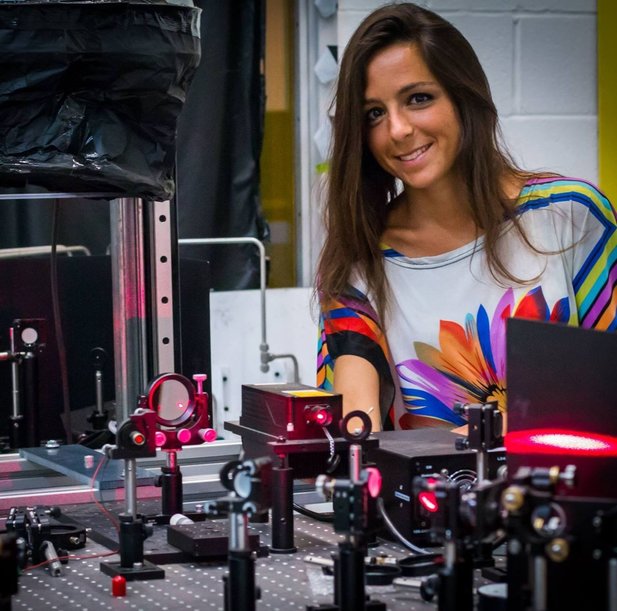Veni grant for ‘Unveil with Laser Diagnostics the local NOx and Flashback physics of H2 flames
Five promising researchers from TU Delft's Faculty of Aerospace Engineering have been granted Veni funding by the Dutch Research Council (NWO). This funding, totaling EUR 280,000 for each recipient, will empower the awardees to advance their individual research concepts over the course of the upcoming three years. Today we introduce Francesca De Domenico.
Research
“Hydrogen-powered jet-engines are promising candidates to decarbonise aviation. With my project, I will contribute on making them a reality. I will build ‘experimental eyes’ on hydrogen flames: a novel laser-based ‘thermometer’ capable of measuring the local temperature and the level of NO produced. With this novel diagnostic, I will be able to explain the mechanisms causing pollutant formation and instabilities in hydrogen flames, which will ultimately lead to the design of strategies to abate them.”

Francesca De Domenico: unique tool
“This Veni is so important to me as it allows me to move to the next steps of my research. I am interested in the development of novel, clean combustion technologies for aviation propulsion, and with this project I will build a unique tool that can help me to understand how ‘clean’ my H2 flames are. Furthermore, this project allows me to synergically merge my background in laser diagnostics development with the research on clean combustion systems H2-based that I am doing here at TU Delft. The technique that I will develop is extremely suitable for high-pressure H2 combustion applications, which is what we need to develop next generation of aeroengines. It will provide unique insights on the stability and NOx emissions of H2 flames, which are the main problems that we need to solve before deploying safe H2 powered airplanes. This technique will help me to further develop the portfolio of advanced laser diagnostics tool for scalar quantities that we have here at the Aerospace Engineering faculty. Also, during this project, I will introduce high-pressure combustion research in our laboratories for the first time. Thus, this grant will help our faculty to further grow in the experimental capabilities for green combustion technologies.”
Green Propulsion Lab
“My research mission is to disruptively tackle the way in which we power aircraft and make them more sustainable by exploiting the unique physical insights provided by experimental data. At TU Delft, I am working towards building a ‘Green Propulsion Lab’ for novel combustion technologies and advanced diagnostics. Ofcourse, there are already infrastructures built from PhD students and colleagues. My goal is to make this lab a leading center for clean combustion. I want to create the cornerstone of an advanced laboratory for developing and testing green combustion technologies. I will unlock the fundamental understanding of the mechanisms of NOx production and flashback in hydrogen flames, generating new knowledge of their behaviour.”
Low-emissions combustion technologies
“The big challenge that we are facing every day is the fight against climate change (goes without saying in these days, referring to the recent fires in all southern Europe). The EU aims to be climate-neutral by 2050, which is both an urgent societal challenge and an opportunity to build a better future. With this project, I will contribute to develop low-emissions combustion technologies, which will impact the environment and public health, and will lead to a societal change as carbon-based fuels are replaced by hydrogen-based ones.”
Diagnostic set-up
“Hydrogen-powered jet-engines are key enablers to decarbonise aviation. However, hydrogen cannot be simply ‘dropped in’ as a fuel in the current aeroengines, as it differs substantially from kerosene currently used in aeroengines. The impact of H2 combustion properties on critical aspects such as stability and NOx production must be physically understood before we can apply hydrogen to green combustion technologies. Experimental data are essential to gain insights into these effects, model hydrogen flows and overcome the current limitations. To date, there is a lack of suitable experimental set-ups and measurement techniques that would permit such insights. By providing a novel tool to measure these fundamental parameters in H2 flames, my results will unlock the understanding of these physical mechanisms, and therefore impact aircraft industries and research organisations.
Not only the diagnostic set-up will be deployed in industrial facilities, but also an improved fundamental understanding of hydrogen combustion will drive the development of clean and safe aeroengines, and consequently a step-change reduction in the flight emissions.”